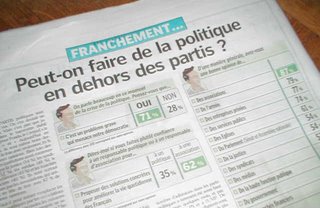Opinions
During the election season, as happens in the USA, the French media publish stories, rumors, pictures, and surveys galore. An attentive reading of such sources can demonstrate to the aware American expat in France just how much the French society differs from the one he or she is used to.
One survey caught Amerloque's eye the other day, Wednesday, January 17, 2007. It was published in Le Parisien, a daily newspaper given far more to facts than to opinions. The complete article was titled "Can one engage in politics outside of political parties ?" (Peut-on faire de la politique en dehors des partis ?) and took up fully one page of the 36-page paper that day. Various questions had been asked of the participants and the results tabulated; the survey had been carried out the week previous to publication by a perfectly reputable polling firm.

Among the questions asked was "Do you generally have a good opinion of ... ?" Here are the results:
"Do you generally have a good opinion of ... ?"
(Institution / percentage of "good")
associations / 87%
the Army / 79%
private companies / 77%
public services / 74%
churches / 61%
Parliament (the Senate and National Assembly) / 54%
the justice system / 54%
trade unions / 53%
the media / 48%
the senior civil service / 47%
government / 47%
financial markets / 40%
political parties / 36%
(Amerloque looked in vain for a recent survey which has taken place in the USA and which has included an equivalent question, at least in its general phrasing. The best he was able to find was USA Today effort measuring honesty and ethics among 23 occupations, Each year Gallup measures honesty and ethics for 14 newsworthy occupations, and nurses topped the list the last time around.)
An American – or other expat – who studies the list of French institutions above will probably feel at home overall, while mentally replacing the words "churches" by "organized religion", "Parliament" by "Congress" (or an equivalent), and, perhaps, if one is particularly pessimistic or skeptical, "the senior civil service" by "entrenched career bureaucrats". "Political parties" are to be found at the bottom of the French list, much as they might be in the USA, Amerloque supposes, given recent history. Hence, apparently, the title of the Parisien article.
However, what must one make of the term "associations" ? Whatever are the French going on about ? Just what is an "association" – and why is it at the top of the list ?
A reporter assigned to France, sitting in her or his office, trolling through the local press and the media for ideas, stories, and viewpoints to wow the folks back home with, will undoubtedly underestimate -- or not even be aware of -- the importance of la vie associative in French society at large. So will the usual chirpy and breathless - and somewhat shallow for the moment, at least, in Amerloque's view - expat residing in Paris, in a chic quartier like the Marais or Saint-Germain-des-Près, wandering from flashy Opera production to artsy cocktail party to packed museum exhibition to self-centered windowshopping to fashionable restaurant or bistro, frequenting other American- or English-speaking expats. Some short- or long-term expatriates working in French companies might be unaware of the ramifications of les associations in France, although their "company committee" (comité d'entreprise) which might just have organized a week's skiing sojourn in Megève or a quick three-day air hop to Istanbul for all the firm's employees, probably addressed itself to a legally-constituted association for the best travel deal. Marrying - or living with - a French national, having or adopting children, dealing with "the system" on a daily basis, genuinely participating in French life 24/7/365, can only help along an expat's understanding of French society and reveal the enormous importance the French attach to this "associative life".
On July 1, 1901 there was published in France a decree governing the establishment of associations. In brief, two or more people could come together in a permanent group in order to share their knowledge and abilities – to carry out a wide range of activities, with the notable exception of "sharing profits". It should thus be understood then that when the French say assocation they mean "nonprofit association". The general locution in France is Association 1901 ("association dix-neuf cent un" or "association mille neuf cent un"). Such associations are basically governed by the principles covering general contract law.
Once a nascent association has followed very simple procedures and filed its statutes in the correct form at the local Prefecture, i.e., gone public, the Association 1901 acquires a legal personality, including responsibility before the law – much as any legal company, partnership, or other entity. The "freedom of association" is an accepted legal principle in France, a right which will not be disappearing anytime soon. If one is a member of an association, one acts in the association's name and not in one's own name. Financing is determined by the association's own statutes: membership fees are generally modest and, of course, services outside the Association can be provided to the public free, at cost or on a cost-plus basis; employees can be hired and fired; and real estate can be owned. Subsidies can be accepted, too.
Naturally, as in most human endeavors, no matter what the country, there have been major and minor abuses, and French associations have most certainly had their share: some of them were carrying out genuinely commercial, for-profit activities and competing fiercely with private sector firms – but not paying tax, including value added tax (VAT) and relevant social charges. The government has tightened up its control of Associations 1901 considerably over the past decade or so: associations' most egregious violations have been sanctioned, and the perpetrators punished.
How many associations are there today in France ? Answers vary. Some sources cite as few as 700,000, while others, including government sources, cite over 1,000,000. No one really seems to know precisely. Government sources stated that 70,000 new associations see the light of day every year – in Amerloque's experience this certainly reflects the reality of French life around him. One encounters associations almost every day in France.

"Just what kind of associations are there ?" the reader may ask. Certainly "Doctors without Borders" (Médecins Sans Frontières) is the most famous throughout the world, having been awarded the 1999 Nobel Peace Prize. Other well-known associations currently active in France are Les Restaurants du Coeur (aka les Restos du Cœur, dedicated to providing meals to the needy) and SOS Racisme (an organization "fighting racism"). These three associations, as well as the latest one to make the front pages here, Les Enfants de Don Quichotte (planting tents for the homeless in the middle of French cities), might also be called NGOs, in Anglo-Saxon parlance, but not necessarily.
The word associations in French covers far more than NGOs or Quangos.
Living in France and want to start up a local soccer or rugby team ? An association is the answer. Need a parents' organization to influence local schools, a French version of the PTA ? An association is the way to go, in parallel with the official representative bodies already in place. Unhappy with a new zoning ordinance, or local trash collection, or a proposed traffic circle, or the mayor's tree cutting policy, or the lack of safe bike paths, or the reliance on imported fur from China within the fashion industry ? Found an association and make one's protests known, as loudly and as often as one desires, while working toward a stated, achievable goal. Want to collect money for general charitable causes - or for sheltering the homeless, or for feeding the indigent, or for helping fellow citizens struck by misfortune, or for providing assistance to destitute African farmers, or for bringing a child with a congenital malformation to France to be operated on ? An association is just the ticket. Worried about where abandoned animals end up, or what happens to retired racehorses ? Une association est tout indiquée.
Thinking about erecting a stone or metal monument linked to a specific historical event, or putting on an art exhibit, or publishing a book, or running sightseeing tours of one's neighborhood, or promoting, say, Amerindian cultures or billiards or diamond mining along the Skeleton Coast or Jain cooking ? As long as an association's activity does not compete unfairly with the for-profit sector, and as long as the association pays the relevant levies and taxes (this is absolutely crucial), an association might fit the bill. Literacy training, minority rights, education in specific occupations or hobbies such as music, assistance to the aged and infirm, help and support for battered spouses, putting on an annual summertime retrospective of old cars open to the public -- all of these activities have associations working on a day-to-day basis, for the betterment of their members and of the society around them. The law on associations was promulgated over a century ago; they are part and parcel of France today.
The French government states that:
-- 10 to 12 million French work "without pay" within associations (NB: the French population totals approximately 62 million people);
-- 20 million individuals over the age of 14 are members of an association;
and, last but not least,
-- 1.6 million salaried workers are employed by initiations, with the social sector employment amounting to the equivalent of 380,000 full-time jobs and the education sector representing 167,000.
Amerloque belongs to many Associations 1901 and has participated in the foundation of quite a number of them during his decades in France. As a founder, or as a member of the Board of Directors, Amerloque has found that la vie associative is an inimitable way of learning about France and the French people. It is also a way to pay back France in some small measure for what it has offered him, of modestly contributing to what he feels is a wonderful place to live.
The number of French people having a good opinion of associations is more than twice as high as the number who feel the same about political parties, and Amerloque is not particularly surprised at all. The French are not passively "waiting for the government to do something", as is so often portrayed in ill-intentioned or misinformed media both in France and abroad. In their millions, they participate in Associations 1901.
Through their associations, the French people are able to influence events around them, and work for liberté, égalité et fraternité, every day.
L'Amerloque
Text © Copyright 2007 by L'Amerloque
One survey caught Amerloque's eye the other day, Wednesday, January 17, 2007. It was published in Le Parisien, a daily newspaper given far more to facts than to opinions. The complete article was titled "Can one engage in politics outside of political parties ?" (Peut-on faire de la politique en dehors des partis ?) and took up fully one page of the 36-page paper that day. Various questions had been asked of the participants and the results tabulated; the survey had been carried out the week previous to publication by a perfectly reputable polling firm.

Among the questions asked was "Do you generally have a good opinion of ... ?" Here are the results:
"Do you generally have a good opinion of ... ?"
(Institution / percentage of "good")
associations / 87%
the Army / 79%
private companies / 77%
public services / 74%
churches / 61%
Parliament (the Senate and National Assembly) / 54%
the justice system / 54%
trade unions / 53%
the media / 48%
the senior civil service / 47%
government / 47%
financial markets / 40%
political parties / 36%
(Amerloque looked in vain for a recent survey which has taken place in the USA and which has included an equivalent question, at least in its general phrasing. The best he was able to find was USA Today effort measuring honesty and ethics among 23 occupations, Each year Gallup measures honesty and ethics for 14 newsworthy occupations, and nurses topped the list the last time around.)
An American – or other expat – who studies the list of French institutions above will probably feel at home overall, while mentally replacing the words "churches" by "organized religion", "Parliament" by "Congress" (or an equivalent), and, perhaps, if one is particularly pessimistic or skeptical, "the senior civil service" by "entrenched career bureaucrats". "Political parties" are to be found at the bottom of the French list, much as they might be in the USA, Amerloque supposes, given recent history. Hence, apparently, the title of the Parisien article.
However, what must one make of the term "associations" ? Whatever are the French going on about ? Just what is an "association" – and why is it at the top of the list ?
A reporter assigned to France, sitting in her or his office, trolling through the local press and the media for ideas, stories, and viewpoints to wow the folks back home with, will undoubtedly underestimate -- or not even be aware of -- the importance of la vie associative in French society at large. So will the usual chirpy and breathless - and somewhat shallow for the moment, at least, in Amerloque's view - expat residing in Paris, in a chic quartier like the Marais or Saint-Germain-des-Près, wandering from flashy Opera production to artsy cocktail party to packed museum exhibition to self-centered windowshopping to fashionable restaurant or bistro, frequenting other American- or English-speaking expats. Some short- or long-term expatriates working in French companies might be unaware of the ramifications of les associations in France, although their "company committee" (comité d'entreprise) which might just have organized a week's skiing sojourn in Megève or a quick three-day air hop to Istanbul for all the firm's employees, probably addressed itself to a legally-constituted association for the best travel deal. Marrying - or living with - a French national, having or adopting children, dealing with "the system" on a daily basis, genuinely participating in French life 24/7/365, can only help along an expat's understanding of French society and reveal the enormous importance the French attach to this "associative life".
On July 1, 1901 there was published in France a decree governing the establishment of associations. In brief, two or more people could come together in a permanent group in order to share their knowledge and abilities – to carry out a wide range of activities, with the notable exception of "sharing profits". It should thus be understood then that when the French say assocation they mean "nonprofit association". The general locution in France is Association 1901 ("association dix-neuf cent un" or "association mille neuf cent un"). Such associations are basically governed by the principles covering general contract law.
Once a nascent association has followed very simple procedures and filed its statutes in the correct form at the local Prefecture, i.e., gone public, the Association 1901 acquires a legal personality, including responsibility before the law – much as any legal company, partnership, or other entity. The "freedom of association" is an accepted legal principle in France, a right which will not be disappearing anytime soon. If one is a member of an association, one acts in the association's name and not in one's own name. Financing is determined by the association's own statutes: membership fees are generally modest and, of course, services outside the Association can be provided to the public free, at cost or on a cost-plus basis; employees can be hired and fired; and real estate can be owned. Subsidies can be accepted, too.
Naturally, as in most human endeavors, no matter what the country, there have been major and minor abuses, and French associations have most certainly had their share: some of them were carrying out genuinely commercial, for-profit activities and competing fiercely with private sector firms – but not paying tax, including value added tax (VAT) and relevant social charges. The government has tightened up its control of Associations 1901 considerably over the past decade or so: associations' most egregious violations have been sanctioned, and the perpetrators punished.
How many associations are there today in France ? Answers vary. Some sources cite as few as 700,000, while others, including government sources, cite over 1,000,000. No one really seems to know precisely. Government sources stated that 70,000 new associations see the light of day every year – in Amerloque's experience this certainly reflects the reality of French life around him. One encounters associations almost every day in France.

"Just what kind of associations are there ?" the reader may ask. Certainly "Doctors without Borders" (Médecins Sans Frontières) is the most famous throughout the world, having been awarded the 1999 Nobel Peace Prize. Other well-known associations currently active in France are Les Restaurants du Coeur (aka les Restos du Cœur, dedicated to providing meals to the needy) and SOS Racisme (an organization "fighting racism"). These three associations, as well as the latest one to make the front pages here, Les Enfants de Don Quichotte (planting tents for the homeless in the middle of French cities), might also be called NGOs, in Anglo-Saxon parlance, but not necessarily.
The word associations in French covers far more than NGOs or Quangos.
Living in France and want to start up a local soccer or rugby team ? An association is the answer. Need a parents' organization to influence local schools, a French version of the PTA ? An association is the way to go, in parallel with the official representative bodies already in place. Unhappy with a new zoning ordinance, or local trash collection, or a proposed traffic circle, or the mayor's tree cutting policy, or the lack of safe bike paths, or the reliance on imported fur from China within the fashion industry ? Found an association and make one's protests known, as loudly and as often as one desires, while working toward a stated, achievable goal. Want to collect money for general charitable causes - or for sheltering the homeless, or for feeding the indigent, or for helping fellow citizens struck by misfortune, or for providing assistance to destitute African farmers, or for bringing a child with a congenital malformation to France to be operated on ? An association is just the ticket. Worried about where abandoned animals end up, or what happens to retired racehorses ? Une association est tout indiquée.
Thinking about erecting a stone or metal monument linked to a specific historical event, or putting on an art exhibit, or publishing a book, or running sightseeing tours of one's neighborhood, or promoting, say, Amerindian cultures or billiards or diamond mining along the Skeleton Coast or Jain cooking ? As long as an association's activity does not compete unfairly with the for-profit sector, and as long as the association pays the relevant levies and taxes (this is absolutely crucial), an association might fit the bill. Literacy training, minority rights, education in specific occupations or hobbies such as music, assistance to the aged and infirm, help and support for battered spouses, putting on an annual summertime retrospective of old cars open to the public -- all of these activities have associations working on a day-to-day basis, for the betterment of their members and of the society around them. The law on associations was promulgated over a century ago; they are part and parcel of France today.
The French government states that:
-- 10 to 12 million French work "without pay" within associations (NB: the French population totals approximately 62 million people);
-- 20 million individuals over the age of 14 are members of an association;
and, last but not least,
-- 1.6 million salaried workers are employed by initiations, with the social sector employment amounting to the equivalent of 380,000 full-time jobs and the education sector representing 167,000.
Amerloque belongs to many Associations 1901 and has participated in the foundation of quite a number of them during his decades in France. As a founder, or as a member of the Board of Directors, Amerloque has found that la vie associative is an inimitable way of learning about France and the French people. It is also a way to pay back France in some small measure for what it has offered him, of modestly contributing to what he feels is a wonderful place to live.
The number of French people having a good opinion of associations is more than twice as high as the number who feel the same about political parties, and Amerloque is not particularly surprised at all. The French are not passively "waiting for the government to do something", as is so often portrayed in ill-intentioned or misinformed media both in France and abroad. In their millions, they participate in Associations 1901.
Through their associations, the French people are able to influence events around them, and work for liberté, égalité et fraternité, every day.
L'Amerloque


